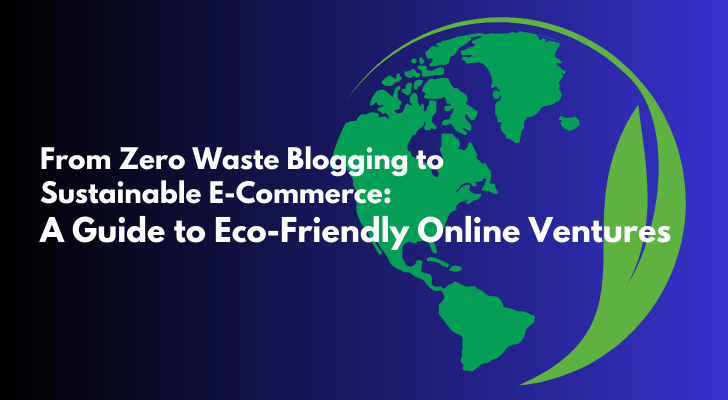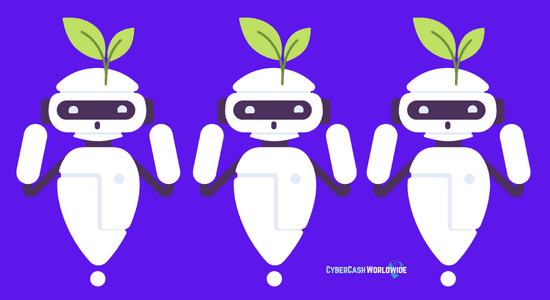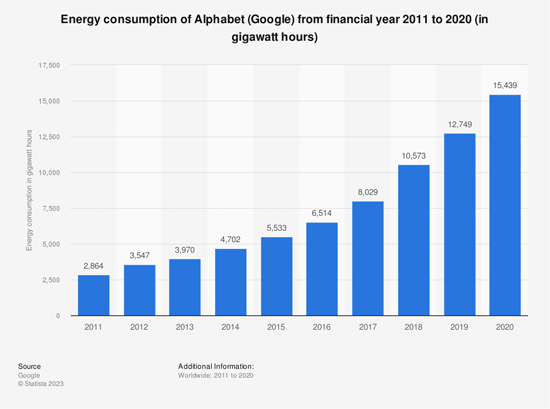An online business is pretty much paperless and the electricity you use is a necessity, there's not much more you can do to make your work eco-friendlier. But it's all about awareness; you can still do a few things to reduce your environmental impact when working from home. We cannot not afford to be more conscious about minimizing carbon footprints.
So let's check out some of the best practices for creating a successful sustainable online enterprise that will not only benefit our planet but also attract customers who share the same values as you do.

Did You Know?
- Market Growth: The global eco-friendly products market is expected to grow by $275 billion by 2030.
- Consumer Demand: About 75% of consumers worldwide are altering their buying habits to favor more environmentally friendly products.
- E-Commerce Shift: Over 60% of online retailers have implemented sustainable practices in packaging, shipping, or product selection.
- Sustainable Packaging: Around 68% of consumers in the U.S. stated that they are more likely to purchase products with minimal or sustainable packaging.
- Carbon Footprint: Online shopping can reduce the carbon footprint by as much as 35% compared to traditional retail.
What Kind of "Digital Waste" Is There?
Because online use is rather a necessity, we tend to neglect the waste on the internet generated by the use of online services and devices. This waste can take many forms, including:
- Electronic waste: Electronic waste, or e-waste, refers to discarded electronic devices such as computers, smartphones, and other electronics that have reached the end of their useful life. These devices often contain hazardous materials such as lead, mercury, and cadmium, which can have negative impacts on the environment if not disposed of properly.
- Energy waste: The energy required to power data centers, servers, and other infrastructure that support the internet can have a significant environmental impact. This includes both the energy used to power the devices themselves, as well as the energy used for cooling.
- Data waste: Data waste refers to the unnecessary storage and processing of digital data. This can occur when users store multiple copies of the same file, keep data they no longer need, or use inefficient file formats.
- Spam and junk mail: Spam and junk mail, including unwanted emails and messages, can clog up inboxes and waste resources.
- Digital clutter: Digital clutter refers to the accumulation of digital files and data that are no longer useful or relevant. This can include old files, outdated apps, and unused accounts.
Reducing waste on the internet can help reduce the environmental impact of digital technologies and make the online world more sustainable. This can be achieved through practices such as reducing energy consumption, properly disposing of electronic devices, and reducing unnecessary data storage and processing.
Is It True That Google Wastes a Lot of Energy?
According to Statista, Google’s energy consumption has increased by over 5 times in the past decade. But does that mean Google is wasting a lot of energy?
Google searches, like any other internet activity, do require energy to operate, including energy used to power the servers that store and process data, and the devices used by users to access the internet. However, it is not necessarily true that Google searches are a waste of energy.
Google, like many other companies, is committed to reducing its environmental impact and has taken various steps to improve the energy efficiency of its data centers and reduce its carbon footprint. For example, Google has invested heavily in renewable energy sources such as wind and solar power to power its data centers. In fact, as of 2021, Google claims to be the world's largest corporate buyer of renewable energy.
Google has also implemented various energy-efficient technologies and practices to reduce its energy consumption and improve its overall energy efficiency.
For example, Google uses machine learning algorithms to optimize its cooling systems and has implemented various measures to reduce the energy consumption of its servers when they are not in use.
In addition, it's worth noting that the environmental impact of a Google search is relatively small compared to other online activities, such as streaming videos or playing online games, which require much more energy to operate.
While it is true that Google searches require energy to operate, it is not necessarily true that they are a waste of energy. Companies like Google are actively working to reduce their environmental impact, and individuals can also take steps to reduce their energy consumption while using the internet, such as by using energy-efficient devices and minimizing unnecessary online activity.
Did You Know?
- Renewable Energy: Approximately 22% of e-commerce businesses use web hosting services powered by renewable energy.
- Waste Reduction: E-commerce ventures focusing on digital products or services contribute significantly to waste reduction by minimizing physical product use.
- Recycled Materials: Over 50% of eco-friendly online stores offer products made from recycled materials.
- Energy Efficiency: About 40% of online businesses have adopted energy-efficient practices in their operations, such as cloud computing.
- Consumer Preferences: 80% of consumers express a willingness to pay more for eco-friendly products.
Zero-Waste Blogging
"Zero" waste doesn't mean zero-carbon emission because that'd be impossible. What we can do is to make sure nothing we use on blogging will end up as waste. Certain things are beyond our control but we can emphasize the eco-friendliness every time we mention a product.
Green Web Hosting
Green web hosting refers to the practice of using renewable energy sources to power web hosting servers and data centers. It involves reducing the carbon footprint and environmental impact of web hosting by using eco-friendly technologies and practices.
Green web hosts typically use renewable energy sources such as solar, wind, and hydropower to generate electricity, and may also implement energy-efficient measures such as using low-power servers and cooling systems.
By choosing a green web host, you too can contribute to the reduction of greenhouse gas emissions and support sustainable energy practices. Green web hosting is becoming increasingly popular as individuals and businesses seek to reduce their environmental impact and promote sustainability.
Optimize Web Speed
Optimizing web speed can reduce energy consumption, especially for web hosting servers and data centers. This is because faster loading times can reduce the amount of time servers need to spend processing and delivering web content, which can lower the amount of energy needed to power and cool the servers.
When websites load slowly, users may become frustrated and abandon the site, leading to increased server processing and energy consumption as the site tries to attract new users. In contrast, fast-loading websites can improve user satisfaction and reduce server load, resulting in lower energy consumption and costs.
Optimizing web speed can be achieved through a variety of techniques, including optimizing images, minimizing code, using caching and content delivery networks, and reducing the number of HTTP requests. By implementing these strategies, website owners can not only improve user experience but also reduce energy consumption and contribute to a more sustainable online ecosystem.
Did You Know?
- Sustainable Shipping: Nearly 65% of e-commerce businesses offer green shipping options, including carbon offset shipping.
- Reuse and Recycling: 55% of online retailers have programs in place for the reuse or recycling of products and packaging.
- Social Responsibility: 70% of millennials are willing to spend more with brands that demonstrate social and environmental responsibility.
- Green Certifications: Around 30% of eco-friendly online businesses hold one or more environmental certification.
- Local Sourcing: 45% of sustainable e-commerce sites prioritize locally sourced products to reduce transportation emissions.
Avoid Sending Too Many Newsletters
As a blogger, you want to build a big list of subscribers so you want as many people to know about your business and buy the products that you promote. But sending too many marketing emails can have negative environmental impacts, primarily due to the energy consumption required to transmit and store the messages. Every email that is sent requires energy to be transmitted and stored on servers and devices, and when a large volume of emails is sent, this energy usage can add up quickly.
There can also be indirect environmental impacts. For example, if recipients receive too many marketing emails, they may become annoyed and be more likely to delete them, which can lead to additional energy usage as the emails are moved to trash folders and deleted from servers.
To reduce the environmental impact of marketing emails, you can take steps to reduce the volume of emails they send and make sure that their messages are targeted to those who are most likely to be interested.
For example, you can segment your email lists and send targeted messages to specific groups of recipients, rather than sending blanket emails to everyone on their list. You can also use email service providers that are committed to reducing their environmental impact, such as those that use renewable energy to power their servers.

How Can You Promote Environmental Issues While Making Money Online?
There are many ways to promote environmental issues while making money online. Here are some examples:
Sell eco-friendly products:
One of the most direct ways to promote environmental issues while making money online is to sell eco-friendly products. This can include products made from sustainable materials, products that help reduce waste or promote recycling, or products that support environmental causes.
Create educational content:
Creating educational content about environmental issues can help raise awareness and promote change. This can include writing blog posts, creating videos or podcasts, or developing online courses or workshops.
Donate a portion of profits:
Another way to promote environmental issues while making money online is to donate a portion of the profits to environmental organizations or causes. This can help support environmental initiatives while also showing customers that the company is committed to sustainability.
Did You Know?
- Digital Products Growth: Sales of digital products, which have a lower environmental impact, have increased by 23% in the last year.
- Investment in Sustainability: 52% of small and medium-sized online businesses plan to invest more in eco-friendly practices.
- Consumer Awareness: Online platforms dedicated to sustainability education and eco-friendly products have seen a 40% increase in traffic over the past year.
- Blogging Impact: Blogs focused on zero waste and sustainability influence over 35% of consumers' purchasing decisions.
- Sustainability Reporting: Over 25% of online businesses now include sustainability reports on their websites, highlighting their environmental efforts.
Partner with environmentally friendly brands:
Partnering with environmentally friendly brands can help promote environmental issues while also generating revenue. This can include affiliate partnerships, joint marketing campaigns, or collaborations on eco-friendly products or initiatives.
Implement sustainable practices:
E-commerce companies can also promote environmental issues by implementing sustainable practices in their operations. This can include using renewable energy sources to power operations, using sustainable packaging materials, and offsetting carbon emissions associated with shipping.
Incorporate sustainable practices, sell eco-friendly products, create educational content, and partner with environmentally friendly brands, and you can help raise awareness about environmental issues and promote change while also generating revenue.
Sustainable e-Commerce Options
Sustainable e-commerce options are ways to reduce the environmental impact of online shopping. Here are some examples:

Eco-friendly products:
Offering eco-friendly products that are made from sustainable materials and have a lower environmental impact can be a great option for e-commerce companies. This can include products made from recycled or upcycled materials, organic and sustainable textiles, and products that are designed to be reusable or have a long lifespan.
Sustainable packaging:
E-commerce companies can reduce their environmental impact by using sustainable packaging materials. This can include using recycled and recyclable materials, reducing packaging size and weight, and avoiding excessive packaging materials.
Carbon offsetting:
E-commerce companies can also offset the carbon emissions associated with shipping their products by purchasing carbon offsets. Carbon offsets are investments in projects that reduce greenhouse gas emissions, such as renewable energy projects or reforestation efforts.
Green shipping options:
E-commerce companies can also offer greener shipping options, such as using electric or hybrid vehicles for delivery, consolidating shipments to reduce the number of deliveries, and offering local pickup or delivery options to reduce shipping distances.
Energy-efficient operations:
E-commerce companies can reduce their energy consumption and associated environmental impact by using energy-efficient lighting and equipment, optimizing heating and cooling systems, and using renewable energy sources to power their operations.
By implementing sustainable e-commerce options, companies can reduce their environmental impact and demonstrate their commitment to sustainability. Additionally, these options can also be appealing to environmentally conscious consumers who are looking to make more sustainable purchasing decisions.
Green Affiliate Products To Promote
There are plenty of sustainable products available in affiliate marketing, ranging from eco-friendly household items to sustainable fashion and beauty products. Some examples of green products that are commonly promoted through affiliate marketing include:
- Sustainable fashion: Clothing, shoes, and accessories made from eco-friendly and ethical materials such as organic cotton, recycled polyester, and vegan leather.
- Eco-friendly household items: Products for the home that are designed to reduce waste and minimize environmental impact, such as reusable straws, bamboo utensils, and compostable trash bags.
- Renewable energy: Products that harness the power of renewable energy sources such as solar panels and wind turbines.
- Natural and organic beauty products: Skincare, makeup, and hair care products that are made with natural, organic, and non-toxic ingredients.
- Green cleaning products: Cleaning supplies that are free from harmful chemicals and use environmentally friendly ingredients such as vinegar, baking soda, and essential oils.
- Electric vehicles and green transportation: Products and services related to electric cars, bicycles, and other forms of sustainable transportation.
These are just a few examples of the types of green products that are available in affiliate marketing. As more and more consumers become interested in sustainable and environmentally friendly products, the range of green products available in affiliate marketing is likely to continue growing.
Radical Environmental Activists - Are They Good or Bad?

Some activists engage in extreme, unconventional, or violent tactics to advocate for the protection and preservation of the environment. It's good to recognize that their actions are often driven by a genuine concern for the environment and the impact that human activities have on it for sure.
While some may view radical environmental activists as a threat to social order, others view them as a necessary force to push for change in a system that is resistant to it. They engage in civil disobedience to draw attention to environmental issues and force governments and corporations to take action. They can be counterproductive and harmful to the cause they are advocating for. Violence and destruction of property can harm innocent people and damage public opinion of environmental causes.
It's good to spare some time to listen to a variety of perspectives to address environmental issues. So don't dismiss those crazy activists, but focus on the underlying issues and the evidence supporting them. Then it'll be possible to identify common ground and work together to find solutions that are both effective and acceptable to all parties involved.
Are Video Advertisements Bad for the Environment?
Video advertisements, like any digital media, have an environmental impact, although the extent of that impact can vary based on a number of factors.
One of the primary environmental concerns associated with video advertisements is the energy consumption required to create, distribute, and display them. The production of videos and their associated hardware, such as cameras and servers, requires significant amounts of energy.
Additionally, when videos are distributed online, they require energy to be stored on servers and transmitted over networks to end users' devices. Finally, when video advertisements are displayed on devices, they consume energy, particularly if the device is not energy-efficient or if the video is of high quality.
Another environmental concern associated with video advertisements is electronic waste. The production of video hardware and devices, such as cameras and screens, can result in significant waste and pollution. Additionally, as devices become outdated or are replaced, they can contribute to the growing problem of electronic waste.
Join The Most Trusted Cryptocurrency Platform For Free
However, it's worth noting that digital media, including video advertisements, can also have some environmental benefits over traditional media. For example, digital media can reduce the need for physical materials, such as paper and ink, which can help reduce deforestation and other environmental impacts associated with paper production.
Video advertisements, like any digital media, have both environmental impacts and benefits. While it's difficult to say definitively whether video advertisements are "good" or "bad" for the environment, it's important to be aware of the environmental impacts associated with digital media and to make choices that minimize those impacts whenever possible.
Is AI Eco-Friendly?

AI can be both eco-friendly and eco-unfriendly, depending on how it is used and the energy sources that power it.
On the one hand, AI can be used to optimize energy use and reduce waste in various industries. For example, AI algorithms can help optimize the energy consumption of data centers, buildings, and transportation systems. Additionally, AI can be used to monitor and predict environmental changes, helping us to better understand and mitigate the impacts of climate change.
On the other hand, AI requires significant computing power, which can consume a lot of energy and generate a large carbon footprint. This is especially true for large-scale AI applications such as deep learning and natural language processing, which require huge amounts of data and computing resources.
Furthermore, the energy sources that power AI can also impact its environmental impact. For example, if AI is powered by electricity generated from renewable sources such as solar or wind power, its environmental impact would be lower compared to if it is powered by electricity generated from coal or other fossil fuels.
In conclusion, AI can be eco-friendly or eco-unfriendly depending on how it is used and the energy sources that power it. It is important to develop and use AI in ways that prioritize sustainability and environmental responsibility.
Conclusion
We all know that some effects of global warming are already irreversible. The melting of ice caps and glaciers has already caused sea levels to rise, the warming of the oceans has damaged our marine ecosystems, and some species have already become extinct due to the changing climate.
Innovative business ideas, designs and technologies mean nothing if we cannot save our children’s future. Agree?
I think all marketers, all business owners should keep promoting environmental issues no matter what their individual circumstances, values, and target audiences may be.
I hope that this post has at least helped you gain insight into how easy it can be to start your own sustainable venture and join others in making our world just a little bit greener.



